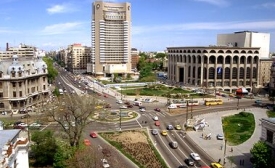europe

Soft power – using diplomacy, co-operation and the powers of attraction rather than coercion – has become a more potent force in international relations over recent decades. During the Ukrainian crisis, Germany, with its conciliatory, sanctions-focused approach, has been a leading exponent of the approach. Yet faced with what looks increasingly like the use of "hard power" by Russian soldiers on Ukrainian soil, its limits are being tested.
A high level Eritrean delegation led by Mr. Osman Saleh, Foreign Minister, conducted working visit to Finland from 25 to 30 August 2014. In the course of its visit the delegation has met with Foreign Minister MR. Erkki Tumoioja and Mr. Pekka Haavisto, Minister of International Development Cooperation and discussed bilateral and regional issues especially with regards educational cooperation and in the development of higher learning and vocational education.
Libya is in civil war, fundamentalist armies are building a self-declared caliphate across Syria and Iraq and Afghanistan's young democracy is on the verge of paralysis. To these troubles are added a resurgence of tensions with Russia and a relationship with China divided between pledges of cooperation and public recrimination. The concept of order that has underpinned the modern era is in crisis.
Europe's failure to stem conflicts raging just outside its borders is calling into question the EU's focus on "soft power," centered on discreet diplomacy, economic incentives and in particular Europe's own example of former enemies working together to build common prosperity.
No. 1: Will there be a deal on Ukraine? The crisis in Ukraine has been a colossal failure of analysis and of diplomacy, with plenty of blame to share on all aides. The main victims, alas, have been the unfortunate Ukrainian people. As I've written before, I think the United States and the West played a key role in causing the crisis, mostly by failing to anticipate that Russia was going to respond forcefully and vigorously to what its leaders regarded as a gradual attempt to incorporate Ukraine into the West.
Tanzania expects tourist numbers to double to 2 million by 2017, the state tourist board said, challenging regional rival Kenya where Islamist attacks have scared away visitors. Tanzania, famed for its pristine beaches and safari parks beneath snow-capped Mount Kilimanjaro, has always played second-fiddle to Kenya, which has a more developed tourism industry and better air links to the key markets in Europe and United States.
In a matter of days, Europe's leaders have dropped the early assessment that the crisis in Iraq was principally humanitarian. Germany has agreed to ship weapons to the Kurds. Italy, too, stands ready to send machine-guns and anti-tank rockets. So, as a first step, Europe's four largest nations have decided to put their confidence in the Kurds even if it eventually increases the chance they will push for a state of their own.







